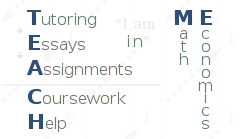Section 1.2: Problem 13 Solution
Working problems is a crucial part of learning mathematics. No one can learn... merely by poring over the definitions, theorems, and examples that are worked out in the text. One must work part of it out for oneself. To provide that opportunity is the purpose of the exercises.
James R. Munkres
An advertisement for a tennis magazine states, “If I’m not playing tennis, I’m watching tennis. And if I’m not watching tennis, I’m reading about tennis.” We can assume that the speaker cannot do more than one of these activities at a time. What is the speaker doing? (Translate the given sentences into our formal language; consider the possible truth assignments.)
Let
="The speaker is playing tennis",
=”The speaker is watching tennis”,
=”The speaker is reading about tennis”. Then, the statements are
,
, besides, we assume that only one of
,
and
can be assigned
at the same time. If the statements are all true, then assuming
is true leads to
and
are both false, and so is the second statement, therefore,
is false, but then the first statement can be true only if
is true, and, hence,
is false. The speaker is watching tennis.
